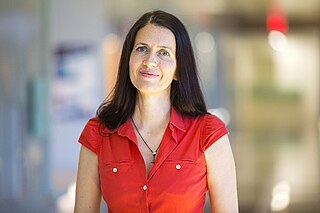Related Research Articles
Information retrieval (IR) in computing and information science is the task of identifying and retrieving information system resources that are relevant to an information need. The information need can be specified in the form of a search query. In the case of document retrieval, queries can be based on full-text or other content-based indexing. Information retrieval is the science of searching for information in a document, searching for documents themselves, and also searching for the metadata that describes data, and for databases of texts, images or sounds.
Gerard A. "Gerry" Salton was a professor of Computer Science at Cornell University. Salton was perhaps the leading computer scientist working in the field of information retrieval during his time, and "the father of Information Retrieval". His group at Cornell developed the SMART Information Retrieval System, which he initiated when he was at Harvard. It was the first system to use the now popular vector space model for information retrieval.
Semantic similarity is a metric defined over a set of documents or terms, where the idea of distance between items is based on the likeness of their meaning or semantic content as opposed to lexicographical similarity. These are mathematical tools used to estimate the strength of the semantic relationship between units of language, concepts or instances, through a numerical description obtained according to the comparison of information supporting their meaning or describing their nature. The term semantic similarity is often confused with semantic relatedness. Semantic relatedness includes any relation between two terms, while semantic similarity only includes "is a" relations. For example, "car" is similar to "bus", but is also related to "road" and "driving".

Ricardo A. Baeza-Yates is a Chilean computer scientist that currently is the Director of Research of the Institute for Experiential AI at Northeastern University in the Silicon Valley campus. He is also part-time professor at Universitat Pompeu Fabra in Barcelona and Universidad de Chile in Santiago. He is an expert member of the Global Partnership on Artificial Intelligence, a member of the Association for Computing Machinery's US Technology Policy Committee as well as IEEE's Ethics Committee.

Timothy Wilking Finin is the Willard and Lillian Hackerman Chair in Engineering and is a Professor of Computer Science and Electrical Engineering at the University of Maryland, Baltimore County (UMBC). His research has focused on the applications of artificial intelligence to problems in information systems and has included contributions to natural language processing, expert systems, the theory and applications of multiagent systems, the semantic web, and mobile computing.
Semantic analytics, also termed semantic relatedness, is the use of ontologies to analyze content in web resources. This field of research combines text analytics and Semantic Web technologies like RDF. Semantic analytics measures the relatedness of different ontological concepts.
James Frederick Allen is an American computational linguist recognized for his contributions to temporal logic, in particular Allen's interval algebra. He is interested in knowledge representation, commonsense reasoning, and natural language understanding, believing that "deep language understanding can only currently be achieved by significant hand-engineering of semantically-rich formalisms coupled with statistical preferences". He is the John H. Dessaurer Professor of Computer Science at the University of Rochester.

Karen Ida Boalth Spärck Jones was a self-taught programmer and a pioneering British computer scientist responsible for the concept of inverse document frequency (IDF), a technology that underlies most modern search engines. She was an advocate for women in computer science, her slogan being, "Computing is too important to be left to men." In 2019, The New York Times published her belated obituary in its series Overlooked, calling her "a pioneer of computer science for work combining statistics and linguistics, and an advocate for women in the field." From 2008, to recognize her achievements in the fields of information retrieval (IR) and natural language processing (NLP), the Karen Spärck Jones Award is awarded annually to a recipient for outstanding research in one or both of her fields.

Roger Michael Needham was a British computer scientist.
David Leigh Waltz was a computer scientist who made significant contributions in several areas of artificial intelligence, including constraint satisfaction, case-based reasoning and the application of massively parallel computation to AI problems. He held positions in academia and industry and at the time of his death, was a professor of Computer Science at Columbia University where he directed the Center for Computational Learning Systems.
In natural language processing and information retrieval, explicit semantic analysis (ESA) is a vectoral representation of text that uses a document corpus as a knowledge base. Specifically, in ESA, a word is represented as a column vector in the tf–idf matrix of the text corpus and a document is represented as the centroid of the vectors representing its words. Typically, the text corpus is English Wikipedia, though other corpora including the Open Directory Project have been used.
Semantic folding theory describes a procedure for encoding the semantics of natural language text in a semantically grounded binary representation. This approach provides a framework for modelling how language data is processed by the neocortex.
Semantic spaces in the natural language domain aim to create representations of natural language that are capable of capturing meaning. The original motivation for semantic spaces stems from two core challenges of natural language: Vocabulary mismatch and ambiguity of natural language.
Gregory Grefenstette is a French-American researcher and professor in computer science, in particular artificial intelligence and natural language processing. As of 2020, he is the chief scientific officer at Biggerpan, a company developing a predictive contextual engine for the mobile web. Grefenstette is also a senior associate researcher at the Florida Institute for Human and Machine Cognition (IHMC).
Shih-Fu Chang is a Taiwanese American computer scientist and electrical engineer noted for his research on multimedia information retrieval, computer vision, machine learning, and signal processing.

Rada Mihalcea is the Janice M. Jenkins Collegiate Professor of Computer Science and Engineering at the University of Michigan. She has made significant contributions to natural language processing, multimodal processing, and computational social science. With Paul Tarau, she is the co-inventor of TextRank Algorithm, which is widely used for text summarization.
Mirella Lapata is a computer scientist and Professor in the School of Informatics at the University of Edinburgh. Working on the general problem of extracting semantic information from large bodies of text, Lapata develops computer algorithms and models in the field of natural language processing (NLP).
To commemorate the achievements of Karen Spärck Jones, the Karen Spärck Jones Award was created in 2008 by the British Computer Society (BCS) and its Information Retrieval Specialist Group. Since 2024, the award has been sponsored by Bloomberg. Prior to 2024, it was sponsored by Microsoft Research.
Jiebo Luo is a Chinese-American computer scientist, the Albert Arendt Hopeman Professor of Engineering and Professor of Computer Science at the University of Rochester. He is interested in artificial intelligence, data science and computer vision.
References
- ↑ Gabrilovich, Evgeniy. "Homepage of Evgeniy Gabrilovich" . Retrieved 7 December 2021.
- ↑ "ACM Names 71 Fellows for Computing Advances That Are Driving Innovation". HPCWire. Tabor Communications, Inc. 19 January 2022. Retrieved 25 March 2022.
- ↑ "Evgeniy Gabrilovich Honored with Prestigious Karen Spärck Jones Award" . Retrieved 7 August 2012.